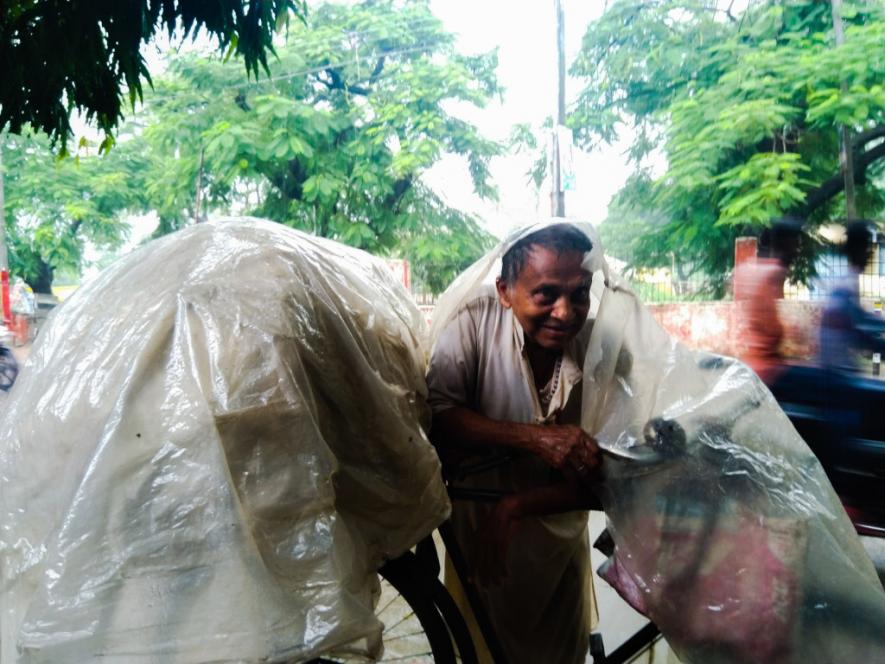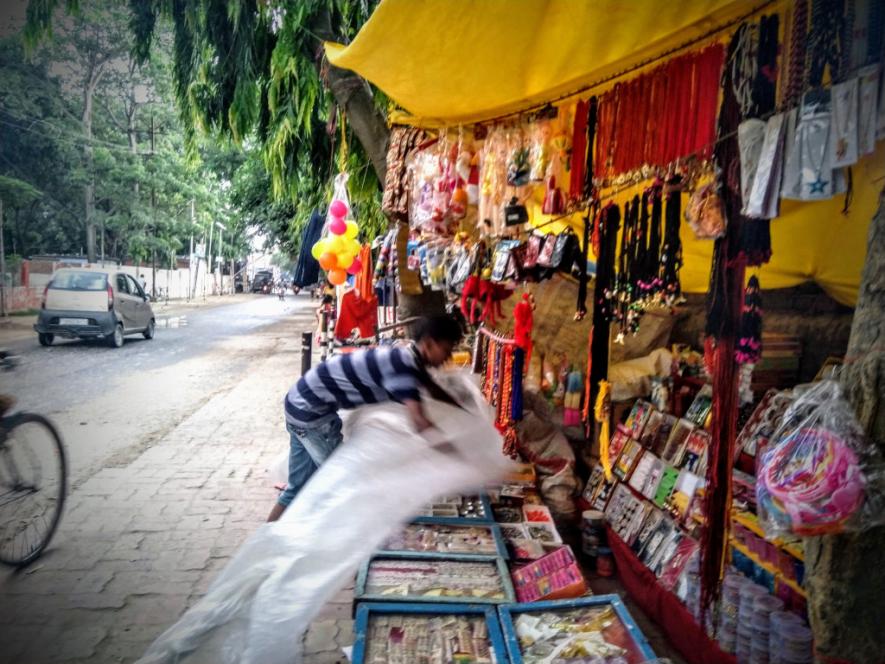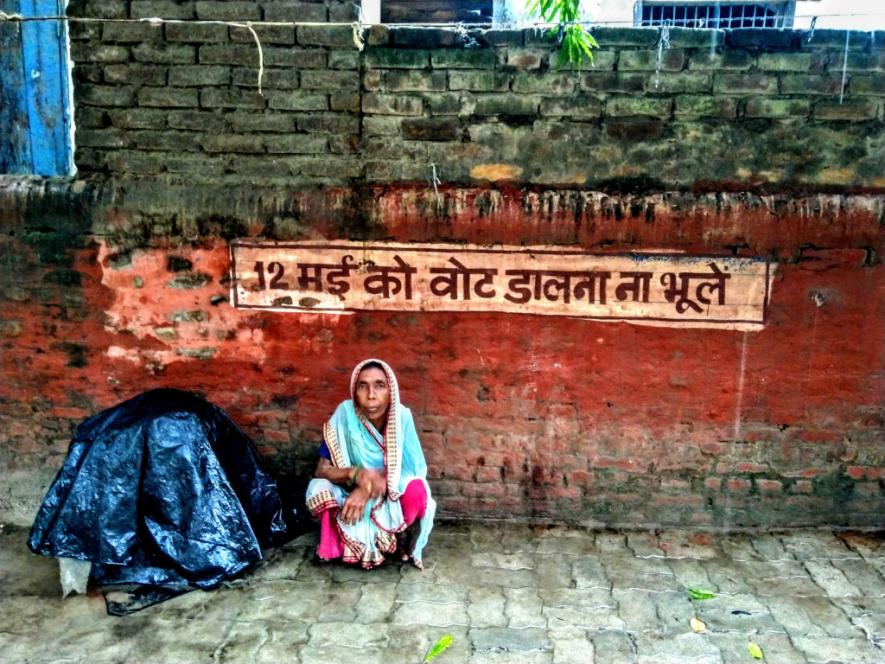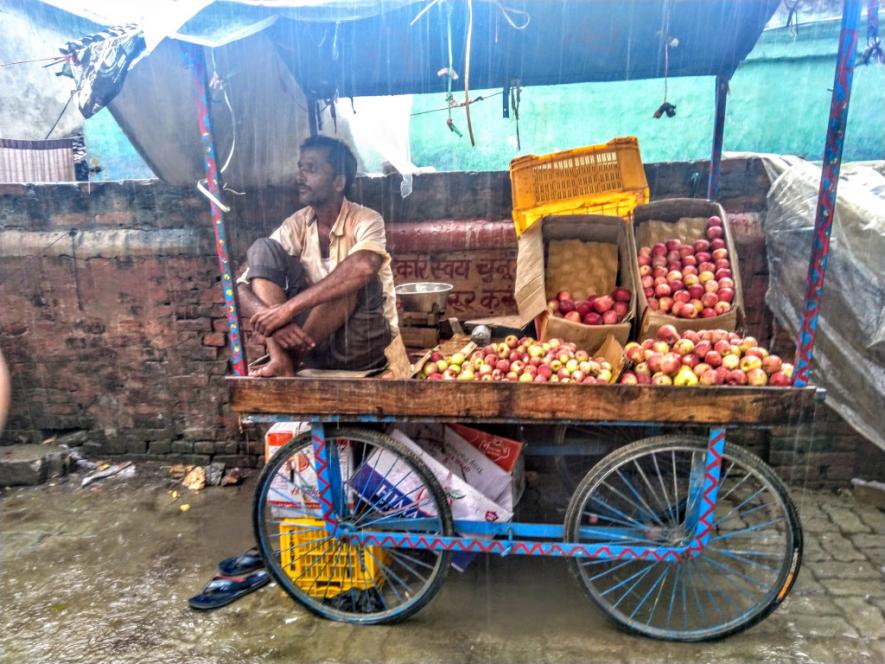Footpath Hawkers in Bihar on the Edge of Ostracisation

Rains in Areraj leave footpath hawkers in despair. | Photos by Ujjawal Krishnam
“The rains are coming,” shouts Vishu Kumar, 16, alerting nearby hawkers as he finds raindrops on his arm. It is not a soulful reminiscence nor the picture of a teenage boy surreptitiously rhyming a 2012 soulful song by Spiritual Spice. In fact, this is an alarm of an impending anthropogenic disorder which would leave many like Vishu penniless for the day.

Vishu covers his shop with plastic covers as it starts to drizzle.
It has been just a few days since the country celebrated Independence Day and Raksha Bandhan. But the clarion that the festivals are over, and time has now come to resume daily routine may sound contradictory to what footpath hawkers of Areraj feel today.
Areraj, a town in East Champaran District, 160 kilometres away from Bihar’s capital Patna, is known in the region for the Someshwar Nath Temple housing a sacred Shiv Lingam, an aniconic representation of the Hindu god, Shiva.
According to folklore, the religious place finds mentions in Hindu religious scriptures like Ramayana and Mahabharata. However, this backbone for successful religious tours has remained neglected for a long time. More than a thousand people run small shops on the footpaths between State Highway 54, beginning from the Main Road, and Someshwar Nath Temple. These hawkers sell items which are largely liturgical in nature; beads, garlands, hand bands and necklaces bearing inscriptions of Lord Shiva. Prasadee or edible offerings like Elaichi Dana (Sweet Makhana), Lai (Toasted Rice), Chiwda (Flattened Rice) and coconut are also sold by these hawkers. They are innate elements of the current religious superstructure and have remained so from time immemorial.
Vishu, who is relatively new to this structure, is trying to adapt to it. He left schooling in 2016, when he was in Class 8. He says, “The financial condition of my family was not good, I had to help my parents overcome it. Now, it seems there is no turning back.”
As this reporter tried to strike a conversation, the rainfall intensity increased. Vishu left the conversation to cover his stall with plastic sheets.
Zarina Khatun, in her late 30s, with all possessions sealed, is sitting on the footpath under a tent made up of a poster lurking from the wall behind her and stretched to trees and knotted untidily with jute ropes. She has items worth of Rs 6,000, such as sindoor [vermillion], tikuli of various designs and sizes, lahathi and chudi (bangles). Khatun says that it is customary for the devotees to gift these items as prasadee to their relatives after they return from Areraj darshan to their respective villages and that “without bringing Prasadee from Areraj, the pilgrimage is meant to be futile”.
Khatun’s husband, Munna Qureshi, is a butcher. “He goes to work once in four days. I have the responsibility to feed and care for my five kids. I could only sell items worth of Rs. 30 till now,” she says. Khatun has a loan of Rs. 40,000 which she has borrowed at an interest rate of Rs 5 per Rs100 charged for each month. “These days, even paying interest rates is unthinkable, let alone returning the whole loan amount,” she adds worriedly.
Noor Jahan Khatun, in her late 60s, runs a shop next to her’s. She also has a loan of Rs. 80,000, taken at an interest rate of 60% per annum. With a possession of Rs 5,000 against 16 times higher target, Noor Jahan is of view that she would not be able to clear the debt. “There is none to the rescue of this [referring to herself] old woman, my children have betrayed me,” says Noor Jahan, who comes to this place daily from her home, travelling more than two kilometres to set up her stall.

Noor Jahan Khatun voted in this parliamentary election but promises about hawkers like her are yet to be fulfilled.
Noor Jahan has packed all her items and is now waiting for the rains to end so that her stall can be reorganised. The awareness message, written on the wall behind her, reads: “Do not forget to vote on May 12.” She also exercised her voting right; however, she thinks that it makes no difference to the sufferings of hawkers.
Like Noor Jahan, the helplessness of Rampari, 60, is no different. A widow, she sells packaged Elaichi Dana, Lai and Chiwada and snacks. Her tent has several holes, so she has taken shelter under Vishu’s shop. “I am manging this all alone. As Shravan mas [Hindu calendar month coinciding with summer and monsoon seasons] has ended, chances are rare that I will make more than Rs. 200 per day in the coming months,” says Rampari. She is looking forward to the festival of Anant Chaturdashi [to be observed in September this year].
We found a shelter from rain under the Mohammed Islam’s shop. Islam, a resident of Janerwa village, sells clothes ranging from kidswear to kanwaria clothes. But he has now packed all cloth items sensing the rains. He says, “This [rain] creates chaos and wastes our energy. We were happy before this footpath was made. We can’t even construct a machan or an elevated bamboo desk here. All things are kept on the ground, so the risk of damage is higher.” Islam had taken an informal loan of Rs. 70,000 which he now feels is difficult to return if his business remains like this. He buys the stock from Motihari’s wholesale market and sells those clothes here, making a paltry profit.
Islam was earlier running his shop near the government office, 100 metres away from present place. He suspects corruption in the channel meant for collecting tax. “I am yet to make profit, but the man [referring to the contractor who has won the tender of tax collection in the area] has already collected the tax,” alleges Islam, telling us that each hawker has to pay a uniform tax of Rs. 40 a day whether the shopkeeper churns profit or not. We are also told that this tax used to be charged at Rs. 5 per day a decade ago. All those listening to Islam shop agreed and said they were asked by the SDO [Sub Divisional Officer] & CO [Circle Officer] to keep their possessions on display out of the collinear periphery of trees planted on the footpath, i.e. a maximum of one metre of distance from the adjacent wall.
The roads here are now metalled, and footpaths have been recently provided with concrete interlocked tile blocks. In contrast, these small but vibrant entrepreneurs feel that the modern administrative system has cornered them, and they are on the verge of becoming social pariahs.
Among the listeners at Islam’s shop was Manjit Kumar, 17, who showed us the waterlogging around his shop which is in low-lying area.
Sanjit Kumar, Manjit Kumar’s younger brother and a student of Class 7 in Rajkiya Madhyavidyalaya [of Areraj Block], stewards the shop having items, we are told, worth Rs. 20,000. He informs his elder brother that he carefully sealed all fragile items. Manjit stretches the shop tent from one end and tilts it to remove the logged rainwater, saying,” Majburi hai, shaukh thode hi hain ye. (This is compulsion, not passion.)” As the rainwater splashes to the ground, the water level around Manjit’s shop further elevates.
A slogan written on a box covered with plastic caught our attention. It read–” Sabka Sath, Sabka Vikash (with all, for everybody's development and having everyone's trust). Asked about its relevance to the present political scenario, Manjit appears to be aware of it, albeit his answer came with an uneasy smile. “This year, many politicians landed in the college ground and promised us with better opportunities. However, none talked about resolving the problem hawkers face in the garb of demolition drives. Hawkers are not rehabilitated, nor are they given any municipality shop on a nominal lease. Our attachment with this sacred shrine for them [referring to authority] has no value too,” he says.
Many here have rented nearby small rooms to store their items. Manjit spends Rs. 400 per month on it. He goes to private tuitions in the evening, though, he doesn’t regularly attend classes at school. Manjit asks,” How would I attend school? I manage the shop till 3 p.m; after Sanjit comes back from school, he is the in charge as I leave for tuitions.” His father is a poldaar, who unloads and loads goods in the market. He set up this shop some 10 years ago for Manjit and his brother to earn for themselves.

Manjit plays a stopper in Football, his team âEleven Starâ reached up to Quarter Finals in inter-district league matches.
Manjit also plays football under the banner of a local club, “New Eleven Star Football Club”, and shows us photos in his mobile phone. “I have a keen interest in football, but in Bihar there is no scope. Government doesn’t encourage us. Prabhakar Jaiswal, who is the Sports Club Secretary of Motihari [East Champaran], doesn’t listen to our demands. We are provided sleeved shirts once in the winter season of an alternate year.” Manjit plays as a stopper in the game. Some time ago, he bought a football kit priced at Rs.1000 as also NIVIA boots for Rs 499, which, he says, was a rare splurge by him.
We also found some thelaawalla–ones who sell eateries on handcarts. They too pay a tax of Rs. 40 a day and have found a company among regular hawkers here. Ravindra Tiwary picked up this business last year. Before this, he was a manual labourer. He makes a maximum profit of Rs. 400 a day by selling fruits. “I have just taken this stock of Rs. 5,000. If the rains continue and apples come in contact with water, the fruits will rot,” he sayd, adding “Who will bear the loss? Had there been a shade and a raised footpath here, none would have been facing this issue.”

Ravindra Tiwary is waiting for rains to stop, his huge apple stock faces a threat of rotting.
Lalan Shah, 55, has a handcart with half a dozen glasses assembled alongside several other boxes containing sattu or gram powder, onions, water and spices. Because of waterlogging, Lalan came out of his day-time makeshift home. He says, “Kahan fayada ba, dasha ba. (There is no profit, just hardship.)” “There is no business without stability– even small businessmen like us earning in three-digit figures know this formula,” he adds. Lalan rushed to Areraj to escape the annual floods in his village Nawada of Harsiddhi Block in East Champaran.
As the heavy rains depart, the hawkers get back to work. However, some are seen leaving the footpath. Among them is Thakur Prasad, 74. He stops to talk to us. He puts his cycle, loaded with more than 10 kilograms of weight, saying,” Ghata lag gael ba, pairo chhochra gaela kh, ka kari bauwa, budh nu bhaeni (I have suffered a loss in business today…even my legs got scratched…what should I do, son…I have become old.)” Thakur Prasad sold items worth of Rs. 150 with the initial cost price of Rs. 120; and made a net profit of Rs. 30. However, the tax collector took away Rs. 40 causing a net loss of Rs. 10 for Thakur.
Thakur vividly remembers several historical events and figures like the Swadeshi movement, Quit India movement, Independence Day, Republic Day, Mahatma Gandhi, and Jawaharlal Nehru which he says were taught in his school. He completed Class 12 in the early 1960s but could not find even a job of the peon, as he did not have enough money to bribe recruiters. “I bought a piece of land in ward number 8 of Areraj main town in late 1950s and devoted myself to this business,” says Thakur Prasad, who originally hails from Pipra Saraiya village of Areraj Block. “After all, I had to do something. There is no meaning of a degree and knowledge in this world for me, as that failed to generate some money and employment for a poor person like me,” he adds.
NewsClick reached out to Wakil Singh, CO, Areraj, for a comment. Singh rejected the accusations made by the hawkers, saying, “There was no such decree of placing stalls in a gap of one metre. Hawkers can run their shops on the right side of the road leading to the Shiva Temple which has been tiled recently. The tiled footpath is levelled, there is no question of waterlogging”
“I do not exactly know the amount of tax imposed on hawkers,” he responded to the allegations of corruption in tax collection.
The writer is an independent journalist and serves as an editor at Academia.edu. He writes on social inequality and rights in India.
Get the latest reports & analysis with people's perspective on Protests, movements & deep analytical videos, discussions of the current affairs in your Telegram app. Subscribe to NewsClick's Telegram channel & get Real-Time updates on stories, as they get published on our website.
























